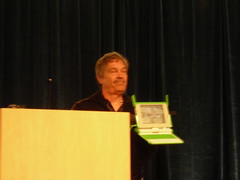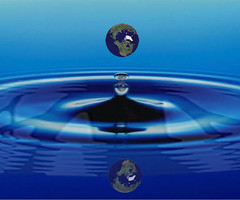2008 is off to a great start. I spent 1 hour and 13 minutes this morning listening to the challenging and visionary ideas of Dr. Alan Kay, who was a keynote speaker at the EduComm 2007 conference this past June in Anaheim, California. I also started the day at the YMCA gym several blocks away from my office in downtown Oklahoma City. My visit was part of a radical departure from my formal exercise regimen of the past year, which consisted of carrying a backpack laden with a dearth of technological weights around with me everywhere I went, and choosing to take the stairs in some buildings at least once per month.
I usually enjoy technologically transformative learning experiences. By “technologically transformative,” in this context I mean learning experiences which would not be possible without technology. Yes, I attended EduComm07 in person, and that experience was facilitated by different types of technology. Today’s learning experience relied on different technologies, however, particularly my iPod and podcasting which allows me to TIME AND PLACE SHIFT in my consumption of media and contemplation of the ideas my selected podcasts include.
In listening to Alan’s keynote again, I realized it is now available (and has been for some time) as an online video courtesy of Apreso. My presentations “What Educators Need to Know About Web 2.0” and “Safe Digital Social Networking” are also available on the EduComm 2007 Post-Event Conference Material website. I’m not sure why my last name is not included in the links to my presentations as they are with most other presenters, but I’m sure it’s not something I should take personally. Providing post-conference video and handout materials like this should be considered BEST PRACTICE for 21st century professional learning conferences. Kudos to District Administration magazine, Gary Stager, and others involved in coordinating EduComm in both providing these materials to the world as well as modeling this practice. My only suggestions would be to explicitly share these works with the assent of presenters under Creative Commons licenses, and provide downloadable/offline copies of presentation videos in a podcast feed/channel to facilitate transformative time/place shifting of media consumption, as I did this morning at the gym with my own audio recording of Alan’s keynote from my podcast channel.
Because I value Alan’s ideas shared at EduComm so much, and he granted me permission to share the audio recording of his presentation, I am concerned about the perpetual preservation and availability of this recording. I can foresee myself utilizing this recording as a mandatory podcast in a pre-service or in-service college class I may teach in the future. I don’t anticipate my own copy of this presentation on my webserver getting deleted or otherwise becoming unavailable, but as long as the media file resides solely on my own server which I have to pay to maintain– it’s future availability remains uncertain. For that reason, I’ve uploaded the audio recording to the Internet Archive. In the first six months of my educational podcasting career (I’m being very liberal with the term “career” since to date my podcasting ventures have not yielded any appreciable income) I was in the habit of uploading all my podcasts with ccPublisher to The Internet Archive. Following the same line of thinking I had about Alan’s EduComm 2007 presentation, I figured it was better to upload and share my podcasts to an organization with the goal of providing “universal access to human knowledge” rather than just keeping the files on my own server. I also feared (slightly) that if my podcast grew popular, the bandwidth consumed on a monthly basis for downloads would exceed that allowed by my current ISP. Those latter fears have proven unfounded, and forsome reason the ccPublisher program stopped working on my Macintosh computer. It needed an update, so I discontinued publishing podcasts to archive.org and instead simply uploaded them to my own server.
Today I downloaded ccPublisher again, hoping it would function well (because of an update) on my Mac OS 10.5 computer. Alas, however, the program launched slowly and crashed after two clicks in the program. I’m not sure if I have corrupted files on my system which are causing this behavior or if the program itself is not functional in Leopard. I downloaded and used the program in WindowsXP using Parallels and attempted the upload again, but got the same crash. I’m thinking ccPublisher as an application must be “broken.” I was able to successfully upload the media file using the Internet Archive’s web UPLOAD interface. That process is not quite as fast and slick as ccPublisher used to make it, but at least it works.
As Brian Lamb shared during his portion of the “three amigos” keynote for K12Online07, “More Than Cool Tools,” the licensing of digital learning objects under Creative Commons and public domain terms and publication on the OPEN WEB is VITAL for 21st century education. As more digital learning objects become available on the open web, where they can be linked and embedded into different courses and media formats to serve varying educational purposes, their value will grow as will the potential learning activities of people around our planet connected to the Internet.
Alan Kay shared LOTS of fantastic ideas during his EduComm07 keynote. The strongest desire I’m left with after hearing his presentation again is to learn how to help students do “real math” and “real science” using digital tools like Squeak and Scratch software. My seven year old daughter asked to do a science experiment during the holidays before Christmas, and unfortunately, I was too busy and otherwise occupied to help meet her request. As Alan said in the keynote, it is impossible to “do real science” without collecting data in the REAL WORLD. It’s not an overly challenging task to help an aspiring scientist, like my 2nd grade daughter, find compelling things to do which develop scientific knowledge and process skills. It does, however, take TIME, and I am resolved to make that time to help her with more science experiments in the coming year. This isn’t something I want to put off, either. I’m hoping to do some scientific investigations together later this week. How often do your own children come to you and say, “Dad, I’d like to do a science experiment today?” I haven’t had that experience much. It’s an opportunity I don’t want to squander.
Alan concluded his presentation by asking some important questions and exhorting the audience to focus on important issues relating to education, learning, and schools. He asked, “What is important knowledge?” I am struck by how critical that question is today more than ever, when we are inundated with information and data. Perhaps sometime in the past, teachers could aspire to teach students EVERYTHING, or something vaguely approximating EVERYTHING, but I doubt that was ever true. Today it certainly is a fantasy, even though our curricular standards maintain that myth. As Alan exhorted his audience, we have to STOP DISTRACTING OURSELVES TO DEATH with technology. As Dr. Seymour Papert has taught (along with Alan,) the “computer allows for new representations of knowledge” which can exceed our own limited frames of reference. Alan started the presentation by quoting McLuhan, who pointed out that most people use the past as their lens to understand both the present and the future. Part of our challenge as evangelists for engaged digital and non-digital learning in the 21st century is helping ourselves as well as others see beyond our historic educational frames of reference, envisioning and realizing a more robust, complex, and rewarding context for learning than those in which we were likely steeped in the 20th century.
Technorati Tags:
education, learning, science, teach, teaching, educomm, educomm07, alankay, research, bestpractice, reform, educationreform, schoolreform
If you enjoyed this post and found it useful, subscribe to Wes’ free newsletter. Check out Wes’ video tutorial library, “Playing with Media.” Information about more ways to learn with Dr. Wesley Fryer are available on wesfryer.com/after.
On this day..
- Engaging with the Duke Polarization Lab – 2024
- Workflow Publishing 30 Normalized Conference Audio Recordings – 2016
- #WhatIf My Ideas on School Reform Become Reality? – 2015
- Lego Stopmotion: Voldemort Meets Gandalf – 2014
- Faculty Require Mastery of Content and Skills – Not Just Technology Use – 2011
- Beautiful Transmediation Example: How To Be Alone – 2011
- Accessing Citrix from Ubuntu – 2010
- Avoid Twply.com and change your Twitter password frequently – 2009
- Categorizing web 2.0 sites by function – 2009
- Join Darren and other K12Online Conveners today LIVE on Manitoba radio and online – 2009



Comments
2 responses to “Morning with Dr. Alan Kay”
I’d call that a ‘wealth’ of technological weight in your backpack, definitely not a ‘dearth’… 🙂
It does seem rather silly at some points… I think I’ve “downsized” a bit since that photo was taken about a year ago at METC (in St Louis.) Carrying around equipment like this is what Miguel Guhlin and I have joked before about being “armed for bear” in the 21st century information environment, or being “well heeled!”